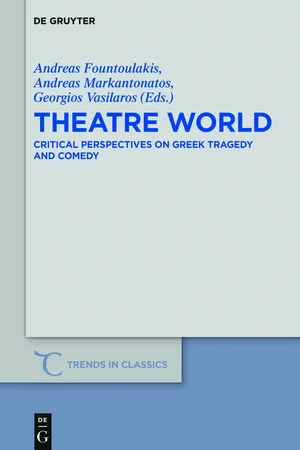
Theatre World
Andreas Fountoulakis, Andreas Markantonatos, Georgios Vasilaros, Andreas Fountoulakis, Andreas Markantonatos, Georgios Vasilaros
- 387 páginas
- English
- ePUB (apto para móviles)
- Disponible en iOS y Android
Theatre World
Andreas Fountoulakis, Andreas Markantonatos, Georgios Vasilaros, Andreas Fountoulakis, Andreas Markantonatos, Georgios Vasilaros
Información del libro
This collection of essays, published in honour of Professor Georgia Xanthakis-Karamanos, addresses topics which lie at the forefront of current research on the fields of Greek drama and classical reception studies. It brings together internationally distinguished scholars who provide fresh insights into issues pertaining to the origins of Greek tragedy and comedy, their generic identity, the structure, the morality or the divine and human characters emerging from individual plays, the presence of Greek drama outside Athens in post-classical times, the associations between drama and genres such as epic and oratory or even the reception of Greek drama in operatic works such as Wagner's Tristan und Isolde. Related art forms, such as music, receive particular attention. Focusing on either broader topics or specific texts, the essays of this volume provide a wide range of theoretical perspectives often combining modern critical trends such as reception studies, narratology or cultural studies with close and acute readings of individual passages. The volume is of particular interest to scholars and students of Greek drama and its reception as well as to anyone interested in Greek culture and its various manifestations.
Preguntas frecuentes
Información
Index of Greek Words
- ἀγαθὴ φύσις 1
- ἀγοραῖος 1
- ἁμαρτία 1, 2
- ἀναγνώρισις 1, 2
- ἀθέμιτα / ἀθέμιστα 1
- ἀμαθία 1
- ἀστεῖος 1
- ἀστός 1
- ἄστυ 1
- ἀτημελέες 1
- αὐτουργός 1
- αὐτόχθονες 1
- δάμιος 1
- δεξιός 1
- δήμιος 1
- δῆμος 1, 2
- δόμος 1
- δράσαντα παθεῖν 1
- δῶμα 1
- εἱμαρμένη 1
- ἔλεος 1
- ἔνδοξος δουλεία 1
- ἑστία 1
- εὐγενεῖς 1
- εὐριπιδαριστοφανίζων 1
- εὐτυχία 1
- ἦθος 1
- κάθαρσις 1, 2, 3, 4, 5, 6
- κακοστένακτος 1
- κενὰ δοξάσματα 1
- κεφάλαια 1
- λαός 1, 2
- λεπτολογία 1
- λεώς 1, 2, 3
- Λύκειος 1
- μείζονες 1
- μοῖρα 1
- οἱ ἐκ πάλαι πλούσιοι 1
- οἱ ἐξ ἀγαθῶν πάλαι 1
- οἶκος 1
- ὅμιλος 1
- ὀνομαστὶ κωμῳδεῖν 1
- ὄχλος 1, 2
- παλλακή 1
- παρθενικαὶ ἀδμῆτες 1
- περιπέτεια 1, 2
- πολιήτης / πολίτης 1, 2
- πόλις 1, 2, 3
- πόλισμα 1
- πολιτικῶς 1
- πόντος Σικελός 1
- προαίρεσις 1
- προστατήριος 1
- πρόσωπον 1, 2
- ῥητορικῶς 1
- σοφός / σοφώτερος 1, 2
- στράτευμα 1
- στρατιά 1
- στρατός 1, 2, 3
- Σωτήρ 1
- Σωτηρία 1
- τρίγωνον 1
- τρυγῳδία 1
- τυραννοφιλία 1
- ὕβρις (see also hubris) 1
- φόβος 1
- χιονώδης 1
- ὠμοβόρος 1
Índice
- Cover
- Title Page
- Copyright
- Table of Contents
- Preface
- I Tragedy and Comedy
- II Individual Plays
- III Reception
- IV Theatre and Music
- Notes on Contributors
- Academic Publications of Georgia Xanthakis-Karamanos
- Index Locorum
- General Index
- Index of Greek Words